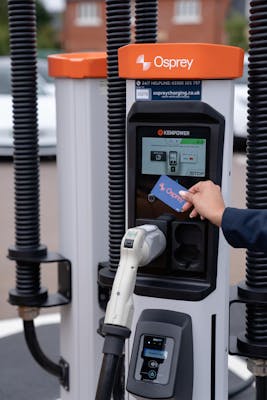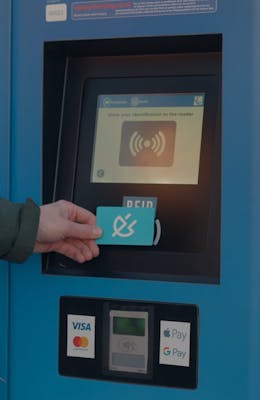What is an RFID card for EV charging?
RFID cards aim to make the EV charging process more convenient and accessible for users. But what exactly is an RFID card, and do you need one to charge your EV?
What is an RFID card?
RFID stands for Radio-Frequency Identification. It's a technology that uses electromagnetic fields to automatically identify and track objects or individuals. An RFID system typically consists of two components: an RFID tag and an RFID reader. The RFID tag contains a unique identifier and is attached to or embedded in the object or item to be identified. The RFID reader emits radio waves, which power the RFID tag and collect data from it.
An RFID card for EV charging is essentially a smart card that utilises RFID technology to facilitate the charging process of an electric vehicle. Each card has a unique identification number stored electronically, allowing you to pay for and use EV charging stations equipped with RFID readers. Think of it as your key to the EV charging world.
Do I Need an RFID Card to Charge My EV?
On many EV charging networks, an RFID card is only one of the many available methods to initiate and authenticate a charging session. Most EV charging stations also accept other forms of authentication, such as mobile apps or contactless payment methods like credit/debit cards. In fact, all rapid charge points in the UK are required to have contactless bank card readers on them.
RFID cards can be provided by charging networks themselves or by roaming providers. This means you can use a single RFID card to access charging stations across multiple networks, simplifying your charging experience when traveling or using different networks in your local area.
So why have RFID cards at all?
User Authentication: RFID cards offer a secure form of user authentication. They can be registered to your account, adding an extra layer of security to your charging transactions.
Efficiency and Convenience: RFID cards offer a quick and efficient way to start a charging session. Simply tap the card on the reader, and the charging process begins. This can be faster than opening an app or entering payment details for contactless methods.
Dedicated Access: Having an RFID card designated for EV charging can streamline the process, allowing you to keep it in your car or wallet, ready for immediate use when needed.
Enhanced Security: RFID cards have built-in security features to protect your information and ensure secure transactions during the charging process. This can provide peace of mind to EV users.
While it's not always necessary to have an RFID card to charge your EV, it offers several benefits, including speed, security, and convenience especially if you charge on a regular basis. Whether you opt for an RFID card offered by a specific charging network or through a roaming provider, or even prefer to use your contactless bank card, the key is to choose the access option that best suits your needs and charging habits as an EV driver.
More driver resources.
Check out the latest driver resources from Osprey Charging below.





